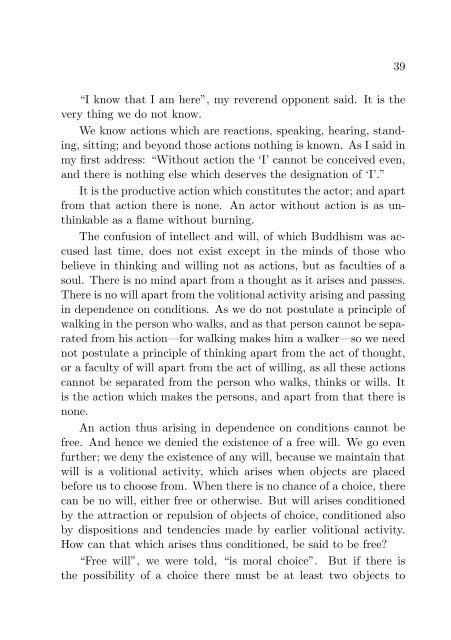Towards the Truth
Notes from a three-day debate in the 1940’s about Buddhism and Christianity.
Notes from a three-day debate in the 1940’s about Buddhism and Christianity.
You also want an ePaper? Increase the reach of your titles
YUMPU automatically turns print PDFs into web optimized ePapers that Google loves.
39<br />
“I know that I am here”, my reverend opponent said. It is <strong>the</strong><br />
very thing we do not know.<br />
We know actions which are reactions, speaking, hearing, standing,<br />
sitting; and beyond those actions nothing is known. As I said in<br />
my first address: “Without action <strong>the</strong> ‘I’ cannot be conceived even,<br />
and <strong>the</strong>re is nothing else which deserves <strong>the</strong> designation of ‘I’.”<br />
It is <strong>the</strong> productive action which constitutes <strong>the</strong> actor; and apart<br />
from that action <strong>the</strong>re is none. An actor without action is as unthinkable<br />
as a flame without burning.<br />
The confusion of intellect and will, of which Buddhism was accused<br />
last time, does not exist except in <strong>the</strong> minds of those who<br />
believe in thinking and willing not as actions, but as faculties of a<br />
soul. There is no mind apart from a thought as it arises and passes.<br />
There is no will apart from <strong>the</strong> volitional activity arising and passing<br />
in dependence on conditions. As we do not postulate a principle of<br />
walking in <strong>the</strong> person who walks, and as that person cannot be separated<br />
from his action—for walking makes him a walker—so we need<br />
not postulate a principle of thinking apart from <strong>the</strong> act of thought,<br />
or a faculty of will apart from <strong>the</strong> act of willing, as all <strong>the</strong>se actions<br />
cannot be separated from <strong>the</strong> person who walks, thinks or wills. It<br />
is <strong>the</strong> action which makes <strong>the</strong> persons, and apart from that <strong>the</strong>re is<br />
none.<br />
An action thus arising in dependence on conditions cannot be<br />
free. And hence we denied <strong>the</strong> existence of a free will. We go even<br />
fur<strong>the</strong>r; we deny <strong>the</strong> existence of any will, because we maintain that<br />
will is a volitional activity, which arises when objects are placed<br />
before us to choose from. When <strong>the</strong>re is no chance of a choice, <strong>the</strong>re<br />
can be no will, ei<strong>the</strong>r free or o<strong>the</strong>rwise. But will arises conditioned<br />
by <strong>the</strong> attraction or repulsion of objects of choice, conditioned also<br />
by dispositions and tendencies made by earlier volitional activity.<br />
How can that which arises thus conditioned, be said to be free?<br />
“Free will”, we were told, “is moral choice”. But if <strong>the</strong>re is<br />
<strong>the</strong> possibility of a choice <strong>the</strong>re must be at least two objects to
















